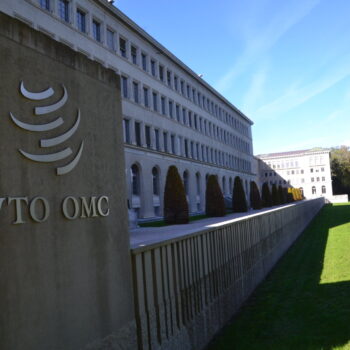As the debate over priorities for EU reform post-Brexit ramps up, misguided attempts to avoid political tensions are undermining popular and necessary action on energy and climate change.
The political debate on what the Brexit vote means for Europe has begun to consolidate and clarify. European politicians have decided that neither UK culture nor exceptionalism caused voters to back leave. Rather the pro-Brexit vote was driven by issues of rising inequality, distrust of political elites and fears of immigration which exist across the EU. The problem was that for decades UK politicians had fuelled these forces for tactical gains and then failed to make a positive case for Europe.
EU polling supports this analysis. UK voters are near the EU average on attitudes towards globalisation, migration and multiculturalism. The UK is exceptional for its absolute levels of recent intra-EU immigration, but in proportion to its population remains part of the pack.
This diagnosis puts European leaders under pressure. They must handle these trends better than David Cameron or suffer a similar political fate. If more Europeans do not rapidly begin to feel more prosperous and secure by working together, then they will continue drifting towards politicians who offer the allure of “taking back control” to the national level.
Finding popular solutions without populism
The EU27 discussion is now moving from analysis to solutions. European political leaders seem to know they must not risk becoming side tracked into abstract discussions about whether this means “more” or “less” Europe. Despite integrationist voices in the European Parliament, domestic pressures mean that most Member States do not want more formal integration. But there is also little support for the idea of removing powers from EU institutions. Europe will need to find ways to take bold steps without altering its basic balance of powers and responsibilities.
The political narrative going into the Bratislava Summit is one of unity, security and popular reform. Donald Tusk’s proposals are heavy on securing European external borders, strengthening cooperation on counter-terrorism and increasing European hard and soft influence in its neighbourhood. By addressing people’s insecurities the hope is Europe can build the political space for continued cooperation and openness. However, the European Commission is already undermining this strategy by doubling down on increasingly unpopular deals like TTIP and CETA.
This illustrates two fundamental tensions in post-Brexit politics. What is needed to address citizen concerns about elite power and security may risk European unity by raising tensions with some Member States or powerful interest groups. What plays well to the European public will often conflict with a desire to show international elites that the EU remains a key global partner.
It is very risky for the political centre to compete on populist territory.This often strengthens the extreme rather than assuaging public fears. A coherent vision is needed for how the citizens of the EU27 will prosper in a more hostile and volatile world. Talking populism while continuing to pursue unpopular policies just continues the erosion of trust in elites.
Understanding the paradoxical EU Climate and Energy debate
European action on clean energy and climate change now risks becoming a victim of these post-Brexit political tensions. European diplomacy had its biggest success in decades in delivering the Paris Climate Change Agreement. But resistance in Poland, backed by its often silent allies, to anything that impacts its failing coal sector has stopped discussions about reopening the 2030 climate package. Even though all countries know that EU domestic climate ambition will need to increase in order to deliver the stricter goals agreed in Paris.
President Juncker argues persuasively that the EU’s delay in ratifying the Paris Agreement has made it look ridiculous internationally. This is nothing compared to the criticism the EU will face if, despite significantly overachieving its Paris emission reductions pledge, it fails to raise ambition when these are reviewed in 2019/20. Europe’s success in delivering faster and cheaper emission reductions than expected should be a source of internal pride and global influence. Unless the EU “resets to real emissions” in 2020 it will lose any leverage it may have in trying to get China, India or the US to significantly increase their reduction offers.
This issue matters to Europeans. Unless all countries do more to cut greenhouse emissions the world will breach the level of “manageable” climate risk agreed in Paris. This will make European citizens less safe; facing increasing damage at home from climatic extremes and greater risks from politically fragile and climate vulnerable countries. Current instability in North Africa and the Middle East occurred at the end of the worst drought in 900 years. Climate events are shifting European opinion. Recent polling shows that climate change is seen as a top threat – comparable to ISIS – in the most climate impacted countries in Europe’s South: Spain, Italy, France and Greece. In contrast, more traditionally “green” countries like Germany, the Netherlands and Sweden are much less worried about climate threats.
Climate change has moved from being an environmental to a security issue for Europeans. However, internal EU tensions means that it has been absent from the revived debate on European security since the Brexit Climate protection could form a powerful underpinning of the new narrative for how EU cooperation protects European citizensvote. Climate and energy issues are not prioritised in the new EU neighbourhood investment fund despite being vital for increasing resilience and stability. Domestically the EU budget is failing to support the most climate vulnerable communities, regions and cities in Europe; despite widespread acknowledgement that they are under protected. Climate protection could form a powerful underpinning of the new narrative for how EU cooperation protects European citizens, but only if Leaders have the courage to resolve their current differences.
Perversely, while climate change is the issue that dare not speak its name in Brussels, the clean economy has never been more popular. Faced with a collapse in EU infrastructure investment the State of the Union speech proposed a €200bn public-private investment boost. The goal is that clean infrastructure, including efficiency, will make up at least 40% of this investment, showing that “green growth” is clearly seen as the future for Europe.
These initiatives are popular with the public and sensible for driving economic growth and resilience. More investment will deliver cheaper and cleaner energy to EU consumers, reducing fuel poverty and generating local jobs by reducing spending on fuels from outside the EU. But this scale of clean investment will not happen just by offering funding, there needs to be a larger pipeline of real projects. However, current EU climate and energy targets are so weak they imply a slowing of clean energy investment over the next decade. Member States are resisting stronger binding targets which would force them to take up cost-effective energy productivity opportunities and deploy renewable energy solutions. Without more ambitious transition pathways clean energy investors and companies will continue to invest outside the EU27 where markets are growing strongly.
Facing the hard politics of the clean energy transition
The reluctance of Member States to accelerate the clean energy transition is not economic but political. The rapid fall in costs of renewable energy, storage and efficiency solutions have disrupted traditional markets, damaging revenues and share prices in many incumbent fossil-fuel based companies. These companies are now understandably pushing back to preserve the value of their assets by slowing progress and tipping the economic playing field against new entrants; for example, through new capacity markets to support fossil fuel power plants. They are garnering strong political support due to their deep entanglement in Member State politics through public share holdings, pension revenues, established supply relationships and tax revenues.
There is a real danger that in pursuit of European “unity” the Commission will fail to propose the bold consumer-focused reforms to EU energy markets needed to take advantage of the new clean, smart technologies and business models. The EU is already far behind the US in deploying digital technologies to the benefit of consumers, mainly because it lacks the strong, transparent regulatory approaches common in many US States. Failing to move forward reform now will not only impact energy consumers but also the ability of Europe to deploy electric cars at scale in the next decade. By siding with energy incumbents politicians also risk a public backlash. Consumers already consider electricity markets to be failing; ranking them 38th out of 42 in consumer satisfaction across the EU.
Reforms of energy markets to ensure consumers benefit from new smart technologies, and can participate on a truly level playing field, would combine popularity and competitiveness. This would not just benefit households but also cities, heavy industry and technology companies which are prevented from playing a global leadership role by outdated markets and infrastructure. The current smart energy revolution is analogous to the telecoms revolution of the 80s and 90s. This required strong EU leadership to break up existing national and local monopolies, and build the infrastructure needed for EU competitiveness.
The Brexit vote also puts a spotlight on the fragmented state of EU external energy policy The Brexit vote also puts a spotlight on the fragmented state of EU external energy policy. With the UK leaving the EU there will be a need to negotiate energy cooperation arrangements across the Northern Seas. Structures that ensure Ireland does not become an energy island and European consumers maximise their benefits from the region’s rich renewable energy resources. Rather than piecemeal approaches this new challenge should lead to a consistent approach to the Energy Union beyond the EU borders. This would include a comprehensive approach to delivering consumer benefits from stronger energy relations to Europe’s South and East; rather than a series of elite sweetheart deals – or arguments – over gas pipelines.
The case for building a new, clean and safe Europe
European leaders rightly want to prioritise policies that make Europe relevant in the world, which their citizens find popular but that deflate populist political bubbles. New climate and energy solutions, driven by incredible advances in technology and thriving global markets, have much to offer. However, these benefits cannot be delivered without re-aligning European climate and energy agendas in the coming years. Thriving investment in clean energy markets needs ambitious and effective climate policy and visa-versa. This requires practical solutions to the differences between Member States, particularly on rapidly phasing out coal use, and tackling incumbent interests. The positive benefits to consumers and citizens far outweigh any perceived risks to European “unity”. There was never going to be a painless way to re-boot the European project. The issue is which areas give the best balance of political costs and benefits; energy and climate change should make that list.


